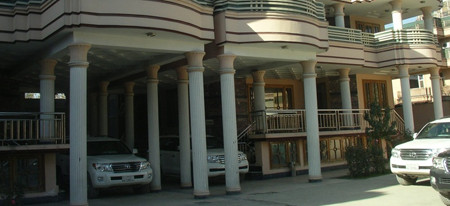A Defense Department task force working to develop war-torn Afghanistan spent $150 million, or 20 percent of its budget, on luxurious housing and private security guards rather than housing employees at military installations, a watchdog found.
The revelation from the Special Inspector General for Afghanistan Reconstruction came in a Nov. 25 letter to Defense Secretary Ash Carter just weeks after the unit—disbanded in March—was found to have spent $43 million on a nonfunctioning gas station in that country.
If employees of the $800 million Task Force for Business and Stability Operations “had instead lived at DOD facilities in Afghanistan, where housing, security and food service are routinely provided at little or no extra charge to D)D organizations, it appears that taxpayers would have saved tens of millions of dollars,” wrote Inspector General John Sopko. His staff estimated that housing just 10 of the task force employees – about the number that occupied the luxury villas, according to former task force officials – at the U.S. embassy compound would have saved $1.8 million.

(Photo: SIGAR)
One contractor provided “personnel with queen-size beds in certain rooms, a flat-screen TV in each room that was 27 inches or larger, a DVD player in each room, a mini refrigerator in each room, and an ‘investor villa’ that had ‘upgraded furniture’ and ‘western-style hotel accommodations,’ SIGAR said. “In terms of food, the contractor was required to provide service that was ‘at least 3 stars,’ with each meal containing at least two entrée choices and three side order choices, as well as three-course meals for ‘special events.’ ”
The decision not to live on U.S. military bases in Afghanistan, the letter suggested, was made by Paul Brinkley, a former deputy undersecretary of Defense and the first director of the task force. Brinkley, a former Silicon Valley engineer, is now chief executive officer of North America Western Asia Holdings, a hotel industry investment fund.
“Our goal was to get businesses running and to encourage private investors and corporations from outside of Afghanistan to engage in the country either as trading partners or as investors,” Brinkley explained in a book he published in 2014, having declined to speak with SIGAR auditors. “Wherever possible, we avoided depending on the military. We were part of their mission … but we avoided living on military bases whenever possible. The goal was to show private companies that they could set up operations in Afghanistan themselves without needing military support.”
SIGAR also questioned the task force’s spending of $57 million from 2010 to 2014 on private armed-support contractors to protect the employees, senior businessmen and guests and ease their mobility in a dangerous environment. That included “secure low-profile transportation … [Voice over Internet Protocol] communications capabilities, on-site laundry service, on-site food and meal service (with light snacks and water/tea/coffee/sodas available 24 hours), business office space to include all equipment necessary to conduct business operations (computers, printers, phones, scanners, desks and chairs), housekeeping, maintenance, grounds and cultural advisers and translators,” SIGAR said.
Such independent arrangements cause friction with the State Department, the report noted. Consultants retained by the task force justified the expenditures by saying personnel “can meet with local [private sector] leaders, officials and investors in the field, not on base” and that this “enables execution of innovative and high-potential-impact projects requiring “in-the-field oversight and management,” according to the letter.
Suggesting that little cost-benefit analysis was performed in advance of the arrangements, Sopko asked Carter to produce any such analysis that exists, to explain whether the task force was authorized to conduct business in this unusual manner, and to provide details on how much success the task force had in attracting investment to Afghanistan. Answers are expected by Dec. 11, the letter said.
At least one senator was troubled by the letter released on Thursday. “I hope this inquiry is the beginning of much more insight into how this task force operated,” said Sen. Chuck Grassley, R-Iowa, chairman of the Judiciary Committee. “So far, the Defense Department hasn’t been forthcoming with task force documents. The concerns raised in SIGAR’s letter don’t inspire confidence that the task force took care with spending.”



